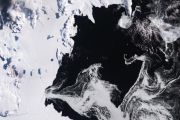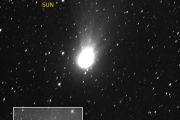
Copernical Team
“We know the drill”: Sentinel-1D begins streamlined simulations training

For over a decade, mission control teams at the European Space Operations Centre (ESOC) have successfully commissioned and operated most of the Sentinel fleet of satellites. This week, in preparation of the coming launch of Sentinel-1D, mission controllers have begun the simulations of the critical ‘launch and early orbit phase’.
NASA Dragonfly Mission Advances Through Crucial Development and Testing Stages
 NASA's Dragonfly mission has successfully cleared several major design, development, and testing milestones, keeping it on track for launch in July 2028.
Dragonfly, a nuclear-powered, car-sized rotorcraft built at Johns Hopkins Applied Physics Laboratory (APL), will journey to Saturn's moon Titan to conduct a three-year exploration of its surface. Following a six-year cruise, the aircraft
NASA's Dragonfly mission has successfully cleared several major design, development, and testing milestones, keeping it on track for launch in July 2028.
Dragonfly, a nuclear-powered, car-sized rotorcraft built at Johns Hopkins Applied Physics Laboratory (APL), will journey to Saturn's moon Titan to conduct a three-year exploration of its surface. Following a six-year cruise, the aircraft SSTL and IHI agree to develop Japanese ISR constellation
 Surrey Satellite Technology Limited (SSTL) and IHI Corporation have signed an agreement to co-develop a small satellite constellation to strengthen Japan's intelligence, surveillance and reconnaissance capabilities. The deal was concluded on 10 September at DSEI in London, underscoring expanding UK-Japan cooperation in space and defence.
The partnership aligns with the 2023 Hiroshima Accor
Surrey Satellite Technology Limited (SSTL) and IHI Corporation have signed an agreement to co-develop a small satellite constellation to strengthen Japan's intelligence, surveillance and reconnaissance capabilities. The deal was concluded on 10 September at DSEI in London, underscoring expanding UK-Japan cooperation in space and defence.
The partnership aligns with the 2023 Hiroshima Accor UC3M research team advances astronaut health protection in microgravity
 A pioneering international initiative involving Universidad Carlos III de Madrid (UC3M) researchers and promoted by the Spanish Space Agency has completed a parabolic flight campaign in Bordeaux, France. The project, led by Professor Ana Diaz Artiles of Texas A and M University, focuses on protecting astronaut cardiovascular and ocular health during long-duration missions.
The team tested
A pioneering international initiative involving Universidad Carlos III de Madrid (UC3M) researchers and promoted by the Spanish Space Agency has completed a parabolic flight campaign in Bordeaux, France. The project, led by Professor Ana Diaz Artiles of Texas A and M University, focuses on protecting astronaut cardiovascular and ocular health during long-duration missions.
The team tested China advances lunar program with Long March 10 ignition test
 China has conducted the second ignition trial of its new heavy-lift Long March 10 rocket, marking a significant step toward future crewed lunar missions.
The test took place Friday at 3 pm at the Wenchang Space Launch Center in Hainan province, where seven engines mounted on a prototype first stage burned for about 320 seconds. According to the China Manned Space Agency, the run successful
China has conducted the second ignition trial of its new heavy-lift Long March 10 rocket, marking a significant step toward future crewed lunar missions.
The test took place Friday at 3 pm at the Wenchang Space Launch Center in Hainan province, where seven engines mounted on a prototype first stage burned for about 320 seconds. According to the China Manned Space Agency, the run successful Sidus Space sets terms for $9.8 million stock sale
 Sidus Space announced it has priced a best-efforts public offering of 9.8 million shares of its Class A common stock at $1.00 per share. The transaction is expected to generate gross proceeds of approximately $9.8 million before deducting placement agent fees and other expenses.
All shares are being issued by the company, which plans to apply the net proceeds toward working capital and gen
Sidus Space announced it has priced a best-efforts public offering of 9.8 million shares of its Class A common stock at $1.00 per share. The transaction is expected to generate gross proceeds of approximately $9.8 million before deducting placement agent fees and other expenses.
All shares are being issued by the company, which plans to apply the net proceeds toward working capital and gen Engine trouble forces Northrop Grumman to delay supply delivery to International Space Station
This request seems a bit unusual, so we need to confirm that you're human. Please press and hold the button until it turns completely green. Thank you for your cooperation!
Press and hold the button
If you believe this is an error, please contact our support team.
185.132.36.159 : 01753d56-a524-4be6-b424-0de886bc
Blue Alchemist is one step closer to creating sustainable infrastructure on the moon
This request seems a bit unusual, so we need to confirm that you're human. Please press and hold the button until it turns completely green. Thank you for your cooperation!
Press and hold the button
If you believe this is an error, please contact our support team.
185.132.36.159 : 0fdd3e2c-91e9-415a-a75c-bc3886f7
XRISM uncovers a mystery in the cosmic winds of change

The X-Ray Imaging and Spectroscopy Mission (XRISM) has revealed an unexpected difference between the powerful winds launching from a disc around a neutron star and those from material circling supermassive black holes. The surprisingly dense wind blowing from the stellar system challenges our understanding of how such winds form and drive change in their surroundings.

































